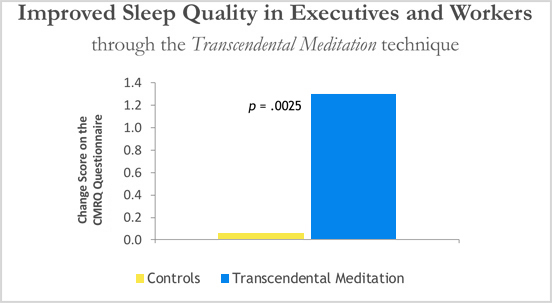Gaining control of your sleep can help with stress. By learning Transcendental Meditation (TM) you take the first step to reducing stress levels and improving your sleep. Women experience anxiety at about twice the rate of men. Not fair, but that is what the data shows.
The National Sleep Foundation recommends that adults 18–64 years need 7–9 hours.
Learn more: Why am I always so tired
Sleep is a key pillar of health. Add TM to your routine for better sleep.

A study of executives and workers in the automotive industry revealed that after 3 months of regular practice of the TM program, participants showed improved sleep quality in comparison to controls from the same work sites.
Although opinions vary as to the causes of insomnia, work anxiety is the factor most frequently identified as the cause. Scientific research indicates that TM is effective in dissipating anxiety; therefore, one might expect this program to naturally alleviate insomnia.
1
You pick a way you want to improve your sleep.
2
Keep track of your habits. This can be done with an app or by journaling.
3
How much sleep do you want to get?
1You pick a way you want to improve your sleep. A pre-bedtime activity is something that you do within the two-hour window before going to sleep. Consider removing the following five activities from your routine close to bedtime to minimize negative sleep quality.
Check the temperature, the mattress, the noise to create a peaceful atmosphere.
Practising Transcendental Meditation 2x a day allows your mind to effortlessly relax which helps you go to sleep.
Plan for an eight- hour sleep by making sleep a priority.
Plan a unique, shift-based schedule that allows you to manage sleep, family and
social activities.
Develop a regular schedule to perform prior to going to sleep.
Keeping a consistent bedtime and wake time leads to better sleep quality. Continue to maintain healthy sleeping habits.
2Keep track of your habits. This can be done with an app or by journaling. 3How much sleep do you want to get?Research suggests 7-9 hours of sleep each day. Set an achievable goal and start small–just
add 30 more minutes of sleep to your night at a time and build it from there.
Curious to understand how sleep impacts your health?
Move the ruler to the number of hours that you sleep per night: